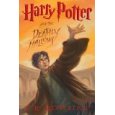Catherine O'Connell-Cahill, Senior Editor
Harry Potter and the Deathly Hollows by J.K. Rowling (Arthur A. Levin, 2007) I stood in the Walgreens checkout line after work in downtown Chicago. It was Friday; the seventh Harry Potter book, Harry Potter and the Deathly Hallows, had been out less than one week.
My 12-year-old daughter had finished reading it and, in fact, I was carrying it under my arm, ready to finish the last 50 pages or so on the train going home. My 18-year-old son would finish it later that weekend.
The cashier was raving about the book to a woman at the counter. "The best saga of the 21st century!" he proclaimed. "And for the first time, J.K. Rowling quotes from the Bible!" he informed her. I realized with a bit of a shock that of course he was right, although I had not identified the line as a scripture quote at the time I had read it.
Rowling borrowed from the Bible in more ways than one, however, for this book. Her seventh book, of all the others, contains the most in the way of biblical themes: self-sacrifice, repentance, forgiveness, and one person dying to save others. ("You have to mention that, Mom," says my daughter, looking over my shoulder. "After all, the whole point of the Christian story is that Jesus died to save us.") The Potter series has never been deep in the way that C.S. Lewis' Narnia series is, nor as rife with Christian imagery. But her seventh book gives its readers, young and old, much to ponder on Christian themes.
I sat down the other day with my daughter and her 11-yr-old cousin to conduct a brief Harry Potter book discussion, knowing that the two of them would have been mulling the same questions that I was about the book: What would I have done in so-and-so's situation? What do you make of this character's fall from grace? And of this character's hidden bravery and dedication in the face of others' hatred? And so on. All good questions to ponder in life if you're 12-or if you're 50, for that matter.
 Bryan Cones, Associate Editor
Bryan Cones, Associate Editor
God and Empire: Jesus Against Rome, Then and Now by John Dominic Crossan (Harper SanFrancisco, 2007)
Books about Jesus could probably fill an entire branch of your local library, and a lot of them cross my desk at some point on their way to the "donate" bin. But every once in a while, a new "Jesus book" catches my eye, and God and Empire by retired DePaul University Professor John Dominic Crossan is the most recent. Though Crossan is perhaps best known for his work as a founding member of the Jesus Seminar, his ability to apply his historical, archeological, and sociological work on scripture to our modern situation makes him a must-read for me.
Crossan begins not in the ancient world but in the contemporary United States, with a challenge to Christians in the world's most powerful nation: "Since the Old Roman Empire crucified our Lord Jesus Christ, how can we be his faithful followers in America as the New Roman Empire?"
He starts with the nonviolent message of Jesus, then explores two responses to it. In the radical equality preached by Paul, Crossan finds a legitimatedescendent of Jesus' "kingdom project," juxtaposing it with what Crossan calls "the pornography of violence" in the Book Revelation. In doing so, he argues convincingly that Christian scripture sanctions both a religion of violence-one allied with the "imperial powers" that oppress humanity-and one of peace, which for Crossan is the only religion that can deliver us from certain and imminent self-destruction.
Crossan leaves us, then, with a choice: Shall we take the path of empire, the "peace" of which is achieved through violence, or shall we walk instead the way of Jesus, with whom peace comes only through justice?
 Heidi Schlumpf, Managing Editor
Heidi Schlumpf, Managing Editor
The Secret Cardinal by Tom Grace (Vanguard, 2007)
I'm not usually a fan of thriller novels, even when they have religious themes. In fact, I only read Dan Brown's The Da Vinci Code because so many friends were asking me my opinion of it. Perhaps I found it ho-hum because I had already studied Mary Magdalene and the early church's treatment of women. But my new interest in the church in Asia has led to me to yet another church thriller, this one with a storyline straight from the headlines.
In The Secret Cardinal, best-selling author Tom Grace, a Catholic from Michigan who has written several high-tech action-adventure novels, takes on the issue of the tense relations between the Vatican and China's Communist government. Based on the real-life story of Pin-Mei Kung, a Chinese bishop secretly elevated to cardinal in 1979 and imprisoned for life for his allegiance to the Vatican, the novel follows recurring character Nolan Kilkenny on his mission to rescue a fictionalized Chinese secret cardinal, with the added pressure of finishing the job before the end of a papal conclave.
Like The Da Vinci Code, this story features plenty of Vatican intrigue and several gory murders. But in The Secret Cardinal those representing the Catholic Church are the good guys.
 Matt Bigelow, Editorial Intern
Matt Bigelow, Editorial Intern
Quoting God: How Media Shape Ideas about Religion and Culture , edited by Claire H. Badaracco
We live in a world inundated with media and bombarded by news. As a people of faith, I believe it is incumbent upon us Catholics to understand the forces and filters that spin the debate on religious issues in the public sphere. And as a graduate journalism student, I believe it imperative to be aware of my own religious leanings, and able to set them aside when needed, to convey the most objective account of events as possible.
In Quoting God, Badaracco gathers a diverse collection of essays on some of the most pressing religious issues of our times: the global rise of fundamentalism, freedom of religion and the separation of church and state, and how religion and faith shape U.S. foreign policy, to name a few. Most interesting for me, Badaracco includes an essay on the characteristic way Catholic journalists report the news versus Protestants and others.
Each essay stands alone as a brief yet balanced and sufficiently broad summary of an important issue of public debate. As a whole, Badaracco's collection will fundamentally alter how we understand and interpret current events here in the United States and abroad. For me, Quoting God serves as a call to be mindful of my own religious convictions and how they influence my work.
 Megan Sweas, Assistant Editor
Megan Sweas, Assistant Editor
The Children of Húrin by J.R.R. Tolkien (Houghton Mifflin, 2007)
Having grown up with a devotion to J.R.R. Tolkien's work, I enjoyed both the storytelling and the depth of The Children of Húrin, posthumously published by his son Christopher. I have always been in awe of the Tolkien's imagination and mastery of language, both English and Elvish. The pace of The Children of Húrin, in which years pass in a single line, is much quicker than the pages of description in the trilogy, but Tolkien's language is still elegant, flowing, and poetic. Christopher's introduction and appendices also helped me find my way through Middle Earth when I was lost in the names and places of the Elder Days.
As imaginative as Middle Earth is, The Children of Húrin, like ancient mythology, has real lessons for today. The story is a warning against the dangers of pride. In the war against the evil, the hero of the story, Túrin, son of Húrin, must face the curse put on him by the enemy, Morgoth. Túrin thinks that he is stronger than his fate and often refuses to listen to counsel. The battle lines between good and evil are stark, but Túrin's pride makes him hurt those he loves. The good intentions of very human characters can have disastrous results. Within us, the lines between good and evil are not so stark, and our flaws become all the more dangerous in war.














Add comment